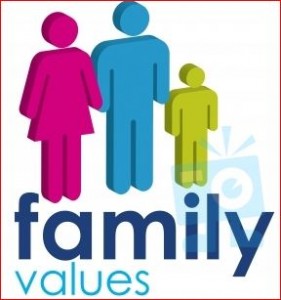As we are preparing for child dedication services this coming Sunday, I’m thinking more and more about family values. Our dedication service for children involves two prayers and a promise. The prayers consist of one of  thankfulness for God’s gift of a new life in our family. Children are of great value to God and must be so to us as well. In a country where, according to a study produced last month, there are 19.6 abortions per every 1000 women in America, we cannot emphasize enough the importance of loving and valuing children. They are a gift from God. We then include a prayer of petition for God’s protection over our children as well as a petition for their hearts to be open to Jesus as early as possible in life. Our prayer is that this new generation will also embrace the values that have made America great. The promise is made by the family and the church family to do our part in preparing the children for life and life’s struggles while holding firm to values that God has ordained in the Bible. God created the family, God blessed the family, and God sustains the family. Jesus affirmed the importance of the man, woman and children together when he said, “what God has joined together, let no man tear apart” (Mark 10:9).
thankfulness for God’s gift of a new life in our family. Children are of great value to God and must be so to us as well. In a country where, according to a study produced last month, there are 19.6 abortions per every 1000 women in America, we cannot emphasize enough the importance of loving and valuing children. They are a gift from God. We then include a prayer of petition for God’s protection over our children as well as a petition for their hearts to be open to Jesus as early as possible in life. Our prayer is that this new generation will also embrace the values that have made America great. The promise is made by the family and the church family to do our part in preparing the children for life and life’s struggles while holding firm to values that God has ordained in the Bible. God created the family, God blessed the family, and God sustains the family. Jesus affirmed the importance of the man, woman and children together when he said, “what God has joined together, let no man tear apart” (Mark 10:9).
According to David Jeremiah, the phrase “Family Values” became prominent in our society, “…in the early 1990’s when the main character of the television sitcom, Murphy Brown, willingly became an unwed mother. A large part of the nation tuned in to that episode to watch the actress Candice Bergen play the role of Murphy Brown and breach yet another traditional value in prime time. The discussion was made even more mainstream by the public comments of Vice-President Dan Quayle who said that Murphy Brown was wrong—that children should be born into a traditional, two-parent family.” Bergen later explained that she did not hold the values of her TV character and personally believed a two parent family is best. But her explanation was an expression of a personal preference, while Quayle was upholding God ordained values.
Chuck Colson explained their differences of perspective. He said, “Dan Quayle and his fellow conservatives are saying something completely different. They’re saying family values are a part of a transcendent moral code that is binding on everyone. They’re saying there are objective standards against which we can measure people’s behavior.” Jeremiah goes on to explain Colson’s comment; “There is a difference between believing something because it feels right to you and believing it because you know it is God’s prescribed order and is therefore right for everyone. Do you see the difference—and therefore the issue? The question is whether God has revealed to us values, principles, and priorities which transcend (are bigger than) our own personal preferences and opinions.”